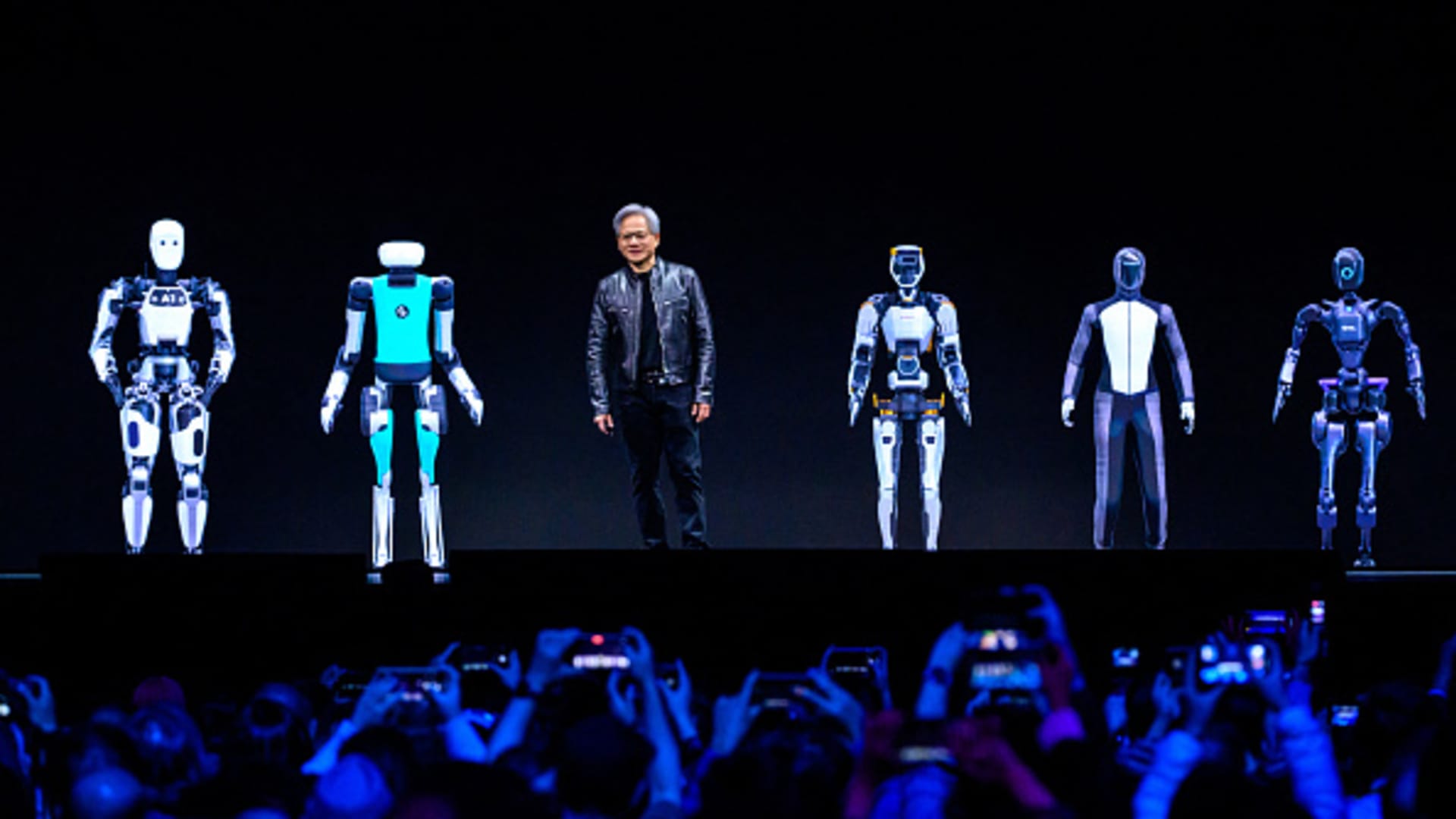China's AI Rise: Nvidia CEO Jensen Huang Sounds The Alarm

Table of Contents
The Scale of China's AI Investment and Growth
China's commitment to becoming a global AI leader is undeniable. Massive government funding, coupled with significant private investment, fuels a relentless pursuit of AI innovation. The ambitious goals set by the Chinese government extend across various sectors, from advanced facial recognition and sophisticated surveillance systems to autonomous vehicles and cutting-edge robotics. This isn't just incremental progress; it's exponential growth.
- Massive Government Investment: China's investment in AI research and development surpasses that of many other nations combined, demonstrating a clear national priority.
- Booming AI Startup Scene: The number of AI startups and research institutions in China has exploded in recent years, creating a vibrant and competitive ecosystem.
- Advancements in Key AI Subfields: China has made significant strides in areas like natural language processing (NLP), computer vision, and machine learning, often challenging the established dominance of Western companies.
- Examples of Success: Companies like SenseTime, specializing in facial recognition technology, and Megvii, focusing on AI-powered security solutions, represent China's rapid progress and global ambitions in AI development.
China's Access to Data: A Key Advantage
One of China's most significant advantages in the AI race is its access to an unparalleled volume of data. Its massive population provides a rich source of information for training AI algorithms, far exceeding the datasets available in other countries. However, this advantage comes with significant ethical concerns surrounding data privacy and potential misuse of information. The relatively relaxed data privacy regulations in China, compared to many Western nations, allow for easier data collection and utilization. This fuels AI development, but also raises serious questions about individual liberties and potential abuses.
- Massive Datasets: The sheer scale of data available in China is a game-changer, offering AI developers an unmatched opportunity for algorithm training and refinement.
- Data Privacy Concerns: The lack of stringent data privacy regulations raises significant ethical concerns, potentially leading to surveillance and the erosion of individual freedoms.
- Role of Big Tech: Chinese tech giants like Alibaba, Tencent, and Baidu play a crucial role in accumulating and utilizing this data, further accelerating the nation's AI development.
- Government Facilitation: The Chinese government actively facilitates data collection and sharing, which significantly benefits AI development but also raises questions about transparency and control.
Jensen Huang's Concerns and Warnings
Nvidia CEO Jensen Huang's recent warnings regarding China's AI progress highlight the growing concerns within the global tech community. Huang's statements emphasize not only the speed of China's development but also its potential geopolitical implications. He expressed concern about China's potential to surpass the US in certain AI fields and the resulting impact on the global balance of technological power. This poses significant challenges for Nvidia and other US tech companies, forcing them to adapt to a new competitive landscape.
- Huang's Explicit Concerns: Jensen Huang's comments have stressed the rapid progress in China's AI sector and the potential for this to shift the balance of global technological power.
- Geopolitical Implications: Huang's perspective underscores the potential for this competition to exacerbate existing geopolitical tensions and create new challenges for international relations.
- Impact on Nvidia: The rise of China as a major AI player directly impacts Nvidia's business model and its position as a key player in the global AI hardware market.
The Geopolitical Implications of China's AI Rise
China's AI rise has profound geopolitical implications. The potential for China to surpass the US in specific AI fields creates a new era of technological competition, with significant implications for national security and international relations. This competition could lead to an intensified arms race, increased cyber warfare, and potentially even AI-driven conflicts. The strategic advantages offered by advanced AI capabilities are substantial, making this competition a defining feature of the 21st century.
- Shifting Global Power Dynamics: China's advancements in AI could dramatically alter the global balance of power, potentially challenging US dominance in several key areas.
- National Security Implications: The implications for national security are significant, with potential consequences for both military applications and civilian infrastructure.
- Potential for AI-Driven Conflict: The increased competition fueled by AI advancements could lead to new forms of conflict and instability in the international arena.
Conclusion: Navigating the Challenges of China's AI Rise
China's rapid progress in AI, as highlighted by Nvidia CEO Jensen Huang's warnings, presents both opportunities and challenges. The scale of investment, access to data, and the potential geopolitical ramifications necessitate careful consideration and strategic planning by governments and businesses alike. The future of AI development and its impact on global power dynamics will be significantly shaped by the ongoing competition between China and other global powers. To navigate this complex landscape effectively, staying informed about developments in China's AI rise and its global implications is crucial. Keep abreast of this rapidly evolving landscape and explore additional resources for a deeper understanding of this critical issue.

Featured Posts
-
 Grab Your Tickets James Arthurs Manchester Concert And Uk Tour 2026
May 30, 2025
Grab Your Tickets James Arthurs Manchester Concert And Uk Tour 2026
May 30, 2025 -
 Setlist Fm Ticketmaster Experiencia Optimizada Para Conciertos
May 30, 2025
Setlist Fm Ticketmaster Experiencia Optimizada Para Conciertos
May 30, 2025 -
 Investigating The Link Between Algorithms And Mass Shooter Radicalization
May 30, 2025
Investigating The Link Between Algorithms And Mass Shooter Radicalization
May 30, 2025 -
 Open Ais Chat Gpt An Ftc Investigation And The Future Of Ai
May 30, 2025
Open Ais Chat Gpt An Ftc Investigation And The Future Of Ai
May 30, 2025 -
 Eventim Reports Robust Growth At The Start Of 2024
May 30, 2025
Eventim Reports Robust Growth At The Start Of 2024
May 30, 2025
